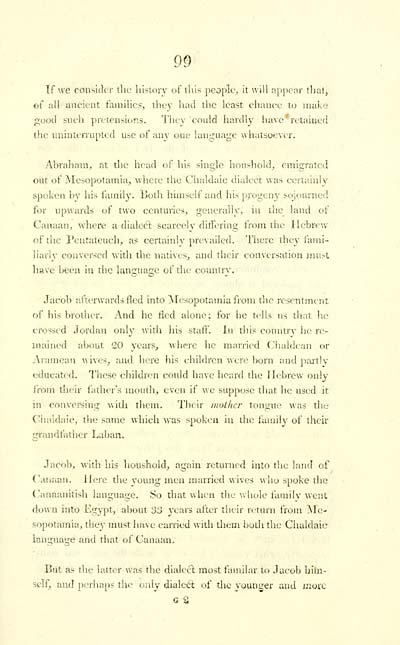Blair Collection > Celtic researches, on the origin, traditions & language, of the ancient Britons
(189)
Download files
Complete book:
Individual page:
Thumbnail gallery: Grid view | List view

99
If w'C οοιίν'κΙοι- the liistory of tliis people, it will appear tliat,
of all aneieiit families, they had the least eliauee U) miik'i
p;o()cl siieh pretensions. 'í'lit'v eould hardly have 'retained
the uninterrupted use of any one lan.L:;Liage whatsoever.
Abraham, at the head of his single honsìiold^ emigrated
out of Mesopotamia, where the Clialdaic diaieet was ceriahdv
spoken by his family. Both himself and his jnOgeny sojourned
for upwards of two centuries, generally, in the land of
Canaan, where a dialeft scarcely diflx-ring from tiie Hebrew
of the Pentateuch, as certain! ν ])revailcd. There they i'ami-
liarly conversed with the iiatives_, and their conversation ]iiu-L
have l)een in the language of the eouiUry.
Jacob afterwards fled into "NFesopotamla from the resentment
of his brother. And he fled alone; for he tells us that he
t-rossed Jordan only with his staff. In this countrv he re-
mained about '20 years, where he iruuTÌed (.'haldean or
Aramcan wives, and here his children were born and paitly
educated. These cliildren could have heard the Hebrew only
from their father's mouth, even if we suppose that he used it
in convening with tliem. Their mother tongue was the-
C-iialdaie, the same whicii was spoken in the family of their
grandfiither Labaii.
Jacob, with his houshold, again returned into the land of
Cau-aan. Here the young men married wives who spoke the
(■anaanitish language. So that when the v.liole familv went
down into Egypt, about 33 years after their return from ^le-
sopotamia, the}- must liave carried with them botli the Chaldaic
language and that of Canaan.
But as the latter was the dialect most familar to Jacob him-
self, and perlia[)s th<• enly diaieet of the vounger and more
If w'C οοιίν'κΙοι- the liistory of tliis people, it will appear tliat,
of all aneieiit families, they had the least eliauee U) miik'i
p;o()cl siieh pretensions. 'í'lit'v eould hardly have 'retained
the uninterrupted use of any one lan.L:;Liage whatsoever.
Abraham, at the head of his single honsìiold^ emigrated
out of Mesopotamia, where the Clialdaic diaieet was ceriahdv
spoken by his family. Both himself and his jnOgeny sojourned
for upwards of two centuries, generally, in the land of
Canaan, where a dialeft scarcely diflx-ring from tiie Hebrew
of the Pentateuch, as certain! ν ])revailcd. There they i'ami-
liarly conversed with the iiatives_, and their conversation ]iiu-L
have l)een in the language of the eouiUry.
Jacob afterwards fled into "NFesopotamla from the resentment
of his brother. And he fled alone; for he tells us that he
t-rossed Jordan only with his staff. In this countrv he re-
mained about '20 years, where he iruuTÌed (.'haldean or
Aramcan wives, and here his children were born and paitly
educated. These cliildren could have heard the Hebrew only
from their father's mouth, even if we suppose that he used it
in convening with tliem. Their mother tongue was the-
C-iialdaie, the same whicii was spoken in the family of their
grandfiither Labaii.
Jacob, with his houshold, again returned into the land of
Cau-aan. Here the young men married wives who spoke the
(■anaanitish language. So that when the v.liole familv went
down into Egypt, about 33 years after their return from ^le-
sopotamia, the}- must liave carried with them botli the Chaldaic
language and that of Canaan.
But as the latter was the dialect most familar to Jacob him-
self, and perlia[)s th<• enly diaieet of the vounger and more
Set display mode to: Large image | Transcription
Images and transcriptions on this page, including medium image downloads, may be used under the Creative Commons Attribution 4.0 International Licence unless otherwise stated. ![]()
| Early Gaelic Book Collections > Blair Collection > Celtic researches, on the origin, traditions & language, of the ancient Britons > (189) |
|---|
| Permanent URL | https://digital.nls.uk/75765960 |
|---|
| Description | A selection of books from a collection of more than 500 titles, mostly on religious and literary topics. Also includes some material dealing with other Celtic languages and societies. Collection created towards the end of the 19th century by Lady Evelyn Stewart Murray. |
|---|
| Description | Selected items from five 'Special and Named Printed Collections'. Includes books in Gaelic and other Celtic languages, works about the Gaels, their languages, literature, culture and history. |
|---|

